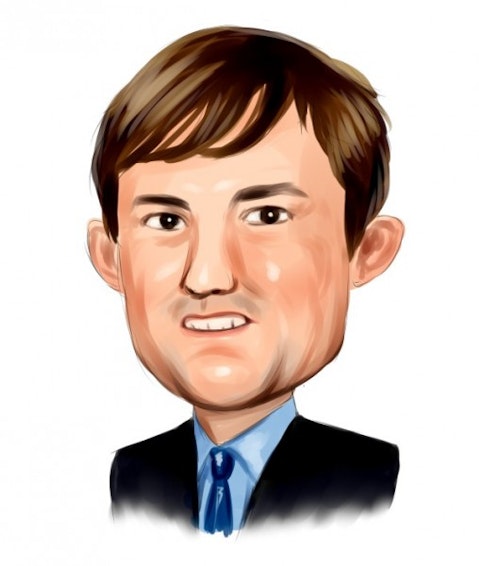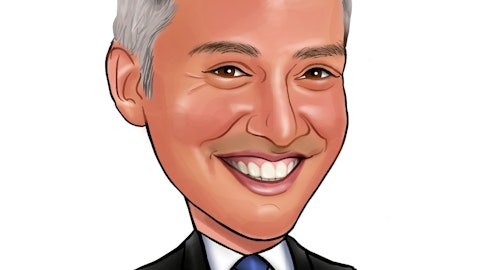Chase Coleman’s Tiger Global Management failed to beat the market this quarter, as its 52 long positions in stocks with a market cap above the $1.0 billion mark generated an average loss of 0.9% according to our methodology. According to its latest 13F filing, the fund’s equity portfolio consisted of 61 positions, and was valued at around $8.47 billion. Furthermore, roughly two-thirds of the investment firm’s capital was allocated in equities belonging to the information technology and consumer discretionary sectors. In addition, Tiger Global’s top ten holdings accounted for more than 55% of its equity portfolio, with Twenty-First Century Fox Inc (NASDAQ:FOXA), Mastercard Inc (NYSE:MA), and Alibaba Group Holding Ltd (NYSE:BABA) standing out as its largest positions. The combined value of the hedge fund’s stake in these three companies amounted to roughly $1.87 billion worth of stock, representing approximately 22% of the value of its equity portfolio.
Chase Coleman, a 39-year old graduate of Williams College, founded Tiger Global in 2001. Mr. Coleman currently runs the highly secretive management firm, while Feroz Dewan is in charge of its equity funds. In addition to boasting around $16 billion in assets under management at the beginning of 2015, the investment firm’s performance over the past two years has been solid, returning 14% in 2013, and 17% in 2014. However, Tiger Global failed to beat the market this quarter. In order to determine the reason for these poor results, we will take a closer look at the performance of the hedge fund’s top three holdings during this period.
Twenty-First Century Fox Inc (NASDAQ:FOXA) was Tiger Global’s top pick at the beginning of 2015, with a stake of 16.80 million shares. According to its latest 13F filing, the position was valued at around $645.40 million, and accounted for 7.61% of the hedge fund’s equity portfolio. Although the consumer cyclical industry returned 7.85% this quarter, beating the 0.9% registered by the S&P 500 by a wide margin, Twenty-First Century Fox dropped 11.51% during this period. Hence, Tiger Global’s biggest bet not only failed to beat the market, but also took its toll on the firm’s overall performance. Despite its poor performance in terms of returns during the first quarter, numerous institutional investors continue to bet on Twenty-First Century Fox Inc (NASDAQ:FOXA). Jeffrey Ubben’s ValueAct Capital increased its exposure to the stock by 21% last quarter and now owns 30.30 million shares, while Boykin Curry’s Eagle Capital Management held 27.56 million shares at the beginning of 2015.
Much like Tiger Global’s top pick, Mastercard Inc (NYSE:MA) was also unable to beat the market, returning a mere 0.47% in the first quarter of 2015. Furthermore, the stock performed far worse than its industry peers, which registered an average return of 4.23% during this period. Nevertheless, Mr. Coleman’s firm was not alone in its bullish stance towards the company. Out of the 739 funds we track, 91 held long positions in Mastercard Inc (NYSE:MA) at the end of the last quarter, including Stephen Mandel’s Lone Pine Capital, with a stake of 20.30 million shares.
Alibaba Group Holding Ltd (NYSE:BABA) was one of Tiger Global’s biggest bets at the beginning of the year, with a position of 5.82 million shares, valued at around $604.48 million. Although the hedge fund was particularly bullish regarding the company, the stock dropped 19.92% last quarter, reducing Tiger Global’s overall returns significantly. Dan Loeb’s Third Point was also affected by the stock’s poor performance, as it held a stake of 10.0 million shares. In fact, Alibaba Group Holding Ltd (NYSE:BABA) was one of the biggest losers among large-cap stocks this quarter, along with Bank of America Corp (NYSE:BAC) and Intel Corporation (NASDAQ:INTC).
It should be clear why tracking the activity of hedge funds such as Tiger Global is important for small investors who are looking for new investment opportunities. However, it is worth mentioning that simply imitating the moves made by major hedge funds rarely guarantees great returns, since most of their top picks are in large-cap stocks. These equities usually don’t beat the market by a large margin, as they are usually more efficiently priced. Hence, we have concentrated our efforts on gathering and analyzing information regarding the top collective small-cap picks of more than 700 hedge funds, which resulted in a small-cap strategy that returned 132% over the past 2.5 years, and beat the S&P 500 ETF (SPY) by nearly 80 percentage points.
Disclosure: None




